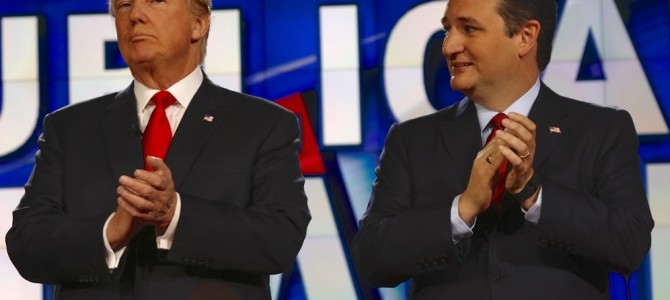
In a presidential race rich in irony, the sole female candidate trails with young women, the party of white men features three minority candidates, and the leading outsider touts his history of donating to elected officials of both parties. Add to this another irony: the constitutional lawyer, Ted Cruz, has a record of fighting abusive lawsuits and, occasionally, the entire legal profession, whereas the business mogul, Donald Trump, embraces litigation as way of life.
Often, Legal Threats Are a Shakedown
As head of the Federal Trade Commission’s (FTC’s) policy team, Cruz challenged collusive settlements that handsomely rewarded lawyers at the expense of consumers. Here’s how it works. Enterprising plaintiffs’ attorneys identify a small wrong allegedly committed against a large number of people.
They then use a convenient legal tool, the class-action lawsuit, to generate a massive damages claim. The merits of the case are an afterthought, as the real goal is to use the threat of exorbitant legal costs—combined with the possibility, however small, of a crippling verdict—to force a quick settlement.
The defendants, in turn, happily agree to sweetheart settlements that pay off the lawyers and leave consumers with nothing. In one settlement involving hidden phone charges, consumers received a “free” month of speed-dial service, after which they would be automatically enrolled at the full subscription rate. The lawyers received something slightly more valuable: almost $1 million in attorneys’ fees.
In another settlement, consumers received “coupons” supposedly worth $262 million for tax preparation services. In reality, the coupons were largely worthless because few consumers actually redeemed them. And who could blame them? The services were by the same firm that allegedly defrauded them in the first place. Nevertheless, the lawyers requested $49 million in attorneys’ fees.
Cruz Fights For Fairness
Under Cruz’s leadership, the FTC worked to protect consumers from such abuses of the legal system. The FTC filed numerous briefs opposing collusive settlement agreements and pushed to ensure that, when attorneys were awarded class-action fees, those fees reflected the attorneys’ actual work, not a flat, unjustified percentage of the recovery. Cruz also attacked the problem more systematically by seeking rule changes to provide consumers with more and better information about class-action settlements.
Cruz also fought to reform the legal system by increasing competition in the legal market. A committed free marketer, Cruz spent the early part of his career fighting crony capitalism in numerous markets, from wine to health care to dental services.
Challenging his own profession, he opposed attempts by various state bar associations to restrict the ability of attorneys to advertise their services and, thereby, compete for new clients. He likewise urged the American Bar Association to allow non-lawyers to provide certain real estate closing services, thereby lowering prices and increasing choices, especially for lower-income consumers.
Trump Benefits Himself at Others’ Expense
In sharp contrast, Trump has embraced litigation as a regular tool of business. Among his more famous lawsuits, Trump sued Merv Griffin, the creator of “Jeopardy!” and “Wheel of Fortune,” for $250 million, his ex-wife Ivana Trump for $25 million, and his next wife’s publicist for $35 million.
He threatened to sue Rosie O’Donnell for saying that Trump was bankrupt, rapper Mac Miller for rapping about him, and MSNBC’s Lawrence O’Donnell for questioning his net worth (Trump actually did sue a New York Times reporter and Warner Books for questioning his net worth). Trump also sued the town of Palm Beach, Florida, the state of New Jersey, and both New York City and state. He even sued Scotland (for building a wind farm).
Trump even took on the NFL. As an owner of the New Jersey Generals in the now-defunct United States Football League, Trump filed an expensive antitrust lawsuit against the NFL. Trump won his lawsuit— but recovered only $1 in damages (trebled to $3 under the antitrust laws).
Trump has brought this approach to politics. During the campaign, candidate Trump has already threatened to sue Cruz for running an ad Trump disagrees with, and warned the owners of the Chicago Cubs they “better be careful” for funding an anti-Trump PAC because they “have a lot to hide.”
Given his track record, one wonders how a President Trump would use the numerous legal and administrative tools at his disposal. How would he respond to an unflattering comment from a broadcaster? To an opposition group that challenges a signature initiative?
If history is any guide, a Cruz administration would seek to reduce abusive litigation. It is unclear what a Trump administration would do. The final irony, it seems, is the choice put to voters: to rein in the legal system, it might be necessary to elect the lawyer.









